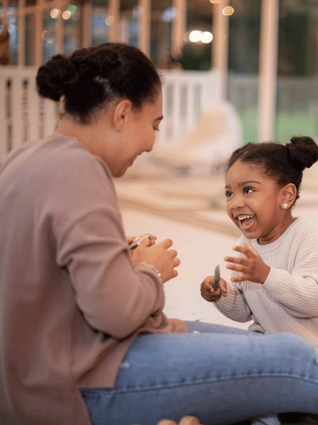
- Home
- Advice Hub
- Toddler
- Toddler Milestones
- Bilingual Language Development
Bilingual language development: Myths and Facts
Discover the truth about bilingual language development, debunk common myths, and learn how to support your child’s linguistic journey with confidence.
As a Speech and Language Therapist specialising in early childhood development, one of the most common concerns I hear from parents is about raising bilingual children. There are numerous myths about bilingual language development that can often lead to confusion and unnecessary worry among parents. Let's delve into these myths and uncover the facts to help you support your toddler's language journey.
1. Being bilingual will delay my child’s speech and language development
This is perhaps one of the biggest misconceptions about raising bilingual children. Research actually suggests the opposite—children exposed to two languages from an early age typically reach language milestones at a similar pace to their monolingual peers. While they may initially mix words or take a little longer to differentiate between languages, this does not indicate a delay. Over time, their language abilities tend to be in line and can even surpass those of monolingual children.
2. I should only speak one language with my child
It's a common belief that speaking one language consistently with a child is necessary for clarity and language development. However, speaking two languages (or more) is perfectly fine if you're proficient in them. “Code-switching” (the seamless transition between languages) is a normal part of bilingual communication and supports linguistic flexibility.
3. I should speak English with my child, even if it’s not my strongest language
Research suggests that speaking in your most proficient language fosters better communication and language development. As a parent, you serve as the primary language role model for your child, so it's crucial to offer high-quality interactions in whichever language you are most competent in. Giving rich language learning opportunities in your home language or mother tongue can also lay the foundation for your child speaking English in the future.
4. If my older child only speaks English, I shouldn’t bother speaking my home language anymore
Parents often feel discouraged if their older child predominantly speaks the community or school language (like English in many cases). However, this shouldn't deter you from continuing to speak your native language at home. Consistent exposure to your language helps preserve cultural identity and instils in children a deep appreciation for their heritage, even if your child does not choose to speak it themselves. Supporting your child to learn your home language will give them the opportunity to use it when they want or need to.
For more information about the benefits of being bilingual as well as tips on how to support your bilingual child see here!
Being bilingual is a gift that opens doors to a world of opportunities for your child. Embrace your family's linguistic diversity and celebrate the unique journey of raising a bilingual family. The key to successful bilingual language development lies in creating a nurturing environment where both languages are valued and encouraged.
